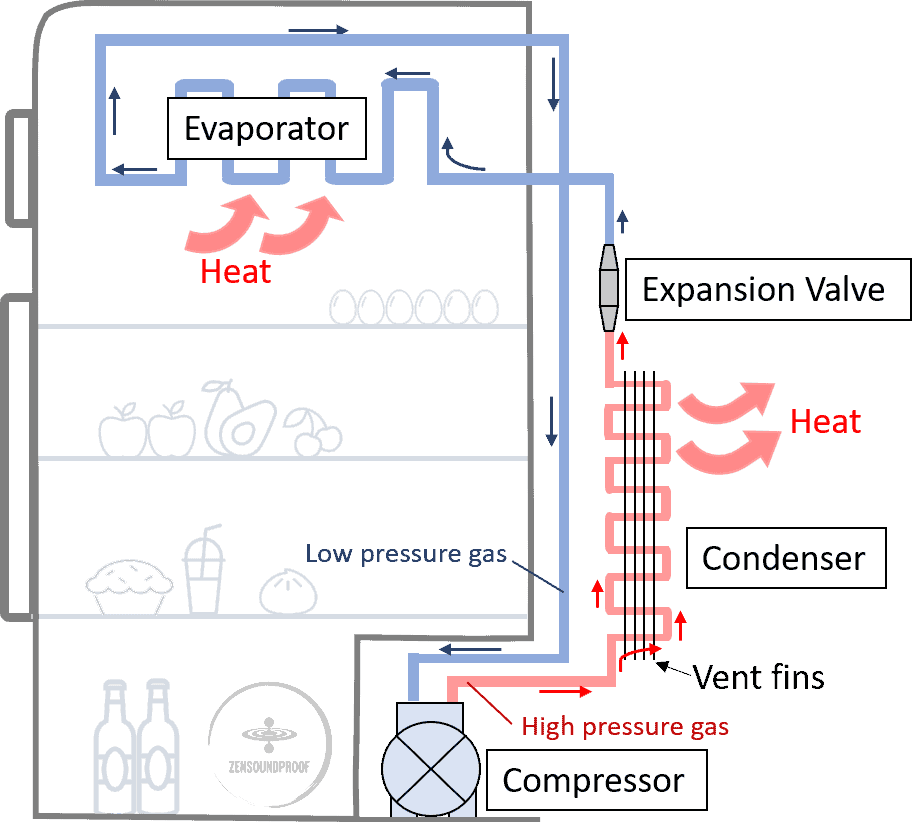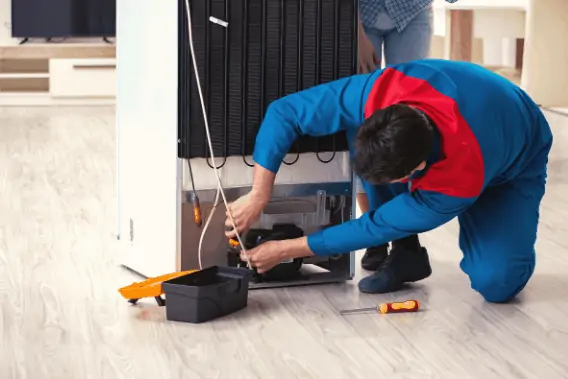While refrigerators are one of the most important appliances in our home, I can’t be alone in finding the noise they make irritating.
If you’re also wondering how to quiet a noisy refrigerator compressor, you’re in the right place.
In this article, I’ll break down exactly how a compressor refrigerator works so you can easily determine the source of noise. Using this information, we’ll then cover the best tips for how to reduce refrigerator noise.
The Principles of a Compressor Refrigerator
The two main types of refrigerator cooling system are compressor and thermoelectric.
Compressors are the most popular and also the noisier option, which is why we’ll focus on them.
A thermoelectric system is quieter; one of the reasons is the absence of a compressor. It’s not too common in kitchen refrigerators, because the cooling range is less reliable than compressor technology. You can find thermoelelectric cooling in mini-fridges, for example.
Regardless of the technology, fridges are designed to keep food cool. In the case of a compressor refrigerator, it does this using 4 main components:
- Evaporator coils
- Condenser coils
- Expansion valve
- Compressor
Of course, all refrigerators share universal components, including insulated walls, storage area, drip tray, and possibly a freezer component. Some of these will be important later, so bear them in mind.
How a Compressor Refrigerator Works
Understanding how a compressor refrigerator works is useful for identifying and managing the noises it makes. It’s quite a simple cycle of 5 steps:
- The compressor raises the refrigerant vapor’s pressure, forcing it into the condenser coils on the back of the refrigerator.
- The hot vapor cools as it passes through the condenser coils because of the surrounding air temperature.
- It then passes into the evaporator coils inside the refrigerator where it cools down.
- In the process, it absorbs heat from inside the refrigerator, bringing the temperature down.
- Finally, the refrigerant becomes a vapor again, enters the compressor, and restarts the cycle.

I recommend checking out this video on how a compressor refrigerator works for a more visual explanation.
It’s completely normal for the back of a refrigerator to get quite hot, as the compressor does a lot of work to turn the gas into a liquid. What’s more, the heat from the refrigerant leaves through the heat exchanger in the back.
Why Does a Compressor Refrigerator Make Noise?
The major disadvantage of a compressor fridge over a thermoelectric one is that the former has more moving parts. The condenser contains a fan, which can be loud, as can the various other components.
It’s completely normal for a refrigerator to make some noise. After all, it’s an electrical appliance and so you can never expect it to be completely silent.
The average noise level of modern refrigerators is between 36 and 47dB, depending on age and condition.
For reference, a whisper is around 30dB and a quiet library is around 40dB. So, a normal functioning refrigerator won’t be the biggest bother. But if yours appears to be making more noise, it’s worth looking into it further.
Main Causes of a Noisy Refrigerator Compressor
As I mentioned, many noises from a refrigerator are completely normal.
But if yours is making strange noises or suddenly sounds louder, please don’t hesitate to call out a professional. The worst thing you could do is mask the signs of a bigger problem.
Here’s a list of the main reasons a compressor refrigerator is noisy.
- Popping – inside walls contracting and expanding with temperature change.
- Vibration – uneven placement on the floor.
- Hissing – refrigerant moving through the coils.
- Whirring – compressor fan kicking in.
- Sizzling – water dripping onto the heater.
- Water running – water dripping into the tray during defrost cycle.
- Dripping – oil flowing in the compressor.
- Gurgling – ice melting during defrost cycle.
- Dribbling – oil flowing in compressor or refrigerant flowing through coils.
- Clattering and grinding – ice being made and removed.
The compressor itself can make more noise than before due to a few reasons. These include the rubber support wearing down, rotor unbalance, and an empty refrigerator (less mass).
Having less stuff in your refrigerator makes it louder due to one of the main soundproofing principles: less mass means an object is easier to vibrate. This issue is compounded if the refrigerator is on an uneven surface.
Where to Start
The first step in working out how to quiet a noisy fridge compressor is to identify the source of the noise. Use the short examples above to troubleshoot your refrigerator.
Also, check out this video to help you identity the most common noises made by a compressor refrigerator.
Once you’ve identified the noise your fridge is making, you can move on to solving the problem using one or more of the solutions below.
How to Quiet a Noisy Refrigerator Compressor
Providing we’re happy that the refrigerator isn’t broken, we can look at some ways to make it quieter.
None of these solutions are particularly expensive or complicated, although you might need a bit of DIY knowledge for some. If you don’t feel confident picking around inside your refrigerator’s working parts, please call a professional.
Here are my top solutions for how to soundproof a noisy fridge compressor.
1. Use dampening materials
The first solution fixes one of the easiest problems: vibrations. Caused by uneven placement on the floor, this is a simple one to solve.
If possible, start by adjusting the legs if you can. Most refrigerators have threads on their feet so they can be raised or lowered. Ensure all the feet are as level as possible before going any further.
I recommend then using a dampening material to prevent vibrations and sound waves from passing into the floor. There are plenty of materials you can use, but something like an EVA foam gym mat or silicone crafting mat will do the job fine.
You can also get anti-vibration pads for this exact issue, such as these. They’re designed for appliances and use a combination of dampening materials to good effect.
2. Clean the condenser fan
A common issue with loud refrigerators is that they’re dirty. Therefore, cleaning the main components regularly is not only an easy way to avoid any problems in the future, but also a effective at improving its energy efficiency.

Start by locating the condenser fan, which will likely be on the back behind a grate. Make sure you disconnect the refrigerator from the power outlet before you go any further.
Here are the steps for cleaning the condenser fan:
- Remove the grate to expose the fan.
- Use a stiff brush to gently remove dust and dirt from the fan blades.
- Wipe it down with a damp cloth, being careful not to wet it too much.
- Use a vacuum cleaner to clean up the mess.
- Replace the grate and plug the refrigerator back in.
You should also take the time to clean around the compressor, which is usually located at the bottom of the fridge.
I recommend doing this every few months to prevent any major problems.
3. Replace noisy parts
While this solution requires a bit more technical know-how, it’s probably one of the most effective solutions.
The main parts that’ll need replacing during a refrigerator’s lifetime are the compressor, and the fan blowing on the condenser. You can replace both of these at the same time, provided you’re able to find replacements.
Here are the steps:
- Disconnect the refrigerator from the wall outlet.
- Turn off the water supply if necessary.
- Find the rear access panel and unscrew it.
- Locate the fan and remove the harness around the compressor motor.
- Unscrew the motor from its support using a socket wrench.
- Replace whatever parts you need: the motor, the compressor, the support, or the fan.
- Screw the relevant parts in place and reconnect the compressor’s harness.
- Fit the access panel back in place.
- Reconnect the water supply and plug the fridge back in.
It can help to take photos of the parts before you start removing things, so you know exactly where they’re meant to go.
If you need a more visual guide, check out this video on how to replace a refrigerator compressor.
4. Use mass loaded vinyl to soundproof the refrigerator
Mass loaded vinyl is a great soundproofing material for blocking noise. It’s limp mass, meaning it doesn’t vibrate, making it ideal for soundproofing against unwanted noise.
If your refrigerator is noisy, installing a layer of MLV on the back will help to mask the problem. You can check out the product here.
The easiest way to install it is either to fix it to the fridge using glue or to mount it on some MDF or plywood and prop this against the back of the fridge.
But this solution does present some problems. Refrigerators need airflow at the back to get rid of the waste heat energy. MLV will stop air from reaching the heat exchanger, meaning this won’t happen.
In fact, an overheating compressor is the number 1 cause of refrigerator failure. So, soundproofing a refrigerator in this way might be effective but it’s not necessarily the best for maximizing the lifespan of your fridge’s components.
I’d only recommend this option as a temporary solution. If your refrigerator is really noisy it’ll provide temporary relief so can be helpful depending on your situation.
5. Defrost the refrigerator
If your fridge doesn’t have an auto-defrost option, be sure to do it manually. If the fan gets a build-up of ice it’ll make much more noise.
To defrost a refrigerator, you’ll need to remove its contents. It can be easiest to do this just before your next shopping trip when it’s not particularly full.
Then, unplug it, remove all the shelves, and lay some towels down. Leaving the doors open will make the ice melt faster. You can use this time to deep clean the shelves and inside, and empty the drip tray if you have access.
6. Consider replacing your refrigerator
This solution might seem obvious, but buying a new refrigerator has many benefits. It’s recommended that you replace your refrigerator every 10 years or so.
Not only will this solve the problem of a noisy compressor, but it also means you’ll get the benefit of a more energy efficient appliance. Both energy consumption and sound emission have improved massively in recent years, so upgrading can make a big difference.
You could then either move the old fridge elsewhere in the house where it won’t be as much of a problem or ensure it gets recycled.
Final Thoughts
Hopefully, this guide has given you some tips on how to quiet a noisy refrigerator compressor.
Most of the solutions are easy and practical, but be sure to call a professional if you think your fridge might be broken. Fridges are not the only appliances using the compressor technology, you can also find this in dehumidifiers.
Do you have any other tips for making a compressor refrigerator quiet? I’d love to hear from you in the comments below.
